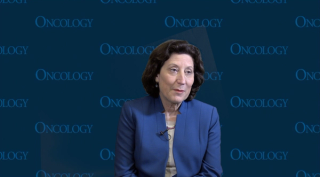
Breast Cancer
Latest News

Latest Videos

CME Content
More News

Minh-Tri Nguyen, MD, and colleagues investigate the association between time to treatment, socioeconomic status, and clinical outcomes among rural and urban patients with breast cancer.

Patients with estrogen receptor–positive, HER2-negative metastatic breast cancer can now receive elacestrant as treatment following the FDA’s approval of the agent.

Closing out their review of the HER2+ metastatic breast cancer treatment landscape, expert oncologists look forward to future evolutions in the paradigm.

Panelists center their discussion on the challenges inherent in managing leptomeningeal metastases in patients with HER2+ breast cancer.

The European Commission approval for trastuzumab deruxtecan in HER2-low metastatic breast cancer is based on data from the phase 3 DESTINY-Breast04 trial.

A brief review of Trop-2 directed therapy and its role in the HR+ metastatic breast cancer treatment landscape.

Centering discussion on HER2-targeted trastuzumab deruxtecan, experts reflect on the presence of HER2-low metastatic breast cancer and optimal treatment strategies.

The panel closes their discussion by musing on the future of HER2 mBC treatments.

Experts share brief insights on novel agents in development for HER2+ breast cancer and consider how they may impact the treatment landscape.

Centering discussion on trastuzumab deruxtecan use in HER2+ metastatic breast cancer, experts elucidate adverse event management and concurrent radiation therapy.

Cisplatin plus veliparib appears to improve progression-free survival among patients with BRCA-like metastatic triple-negative breast cancer, but not in those with non–BRCA-like metastatic breast cancer.

After briefly addressing resistance to endocrine therapy, expert panelists broadly review novel treatment modalities in the setting of HR+ metastatic breast cancer.

Expert perspectives review a case of relapsed HR+ metastatic breast cancer and consider treatment options available in the second line and beyond.

Yancey Warren, Jr, MD, MAT, and Lejla Hadzikadic-Gusic, MD, MSc, spoke with CancerNetwork® about their work investigating the use of integrative oncology services among young patients diagnosed with breast cancer.

Judy C. Boughey, MD, of Mayo Clinic in Rochester, Minnesota details the efficacy of breast-conserving surgery in patients with multiple ipsilateral breast cancer.

Judy C. Boughey, MD, of Mayo Clinic in Rochester, Minnesota, details the multidisciplinary work that goes into delivering breast-conserving therapy for patients with multiple ipsilateral breast cancer.

The investigational drug CFI-402257 alone and in combination with fulvestrant received fast track designation from the FDA for patients with estrogen receptor–positive, HER2-negative advanced breast cancer.

A brief review on how best to use MRI following CNS-directed radiation therapy in patients with HER2+ metastatic breast cancer.

Following review of the final patient scenario, panelists consider later-line treatment options in the setting of multiply relapsed HER2+ metastatic breast cancer.

Judy C. Boughey, MD, of Mayo Clinic in Rochester, Minnesota discusses the incidence of complications and patient-reported outcomes associated with breast conservation therapy for multiple ipsilateral breast cancer.

An expert from the Mayo Clinic notes that there’s also a great amount of interest in further optimizing the dose of radiation after mastectomy, especially in patients with breast cancer immediately following reconstruction.

A contingent of patients with a type of lung cancer and breast cancer continues to experience responses to treatment with zotatifin, according to updated study findings.

Highlights from key clinical data informing the selection of targeted therapy in particular subsets of patients with HR+ breast cancer.

Comprehensive insight to the selection of CDK4/6 inhibitors as first-line therapy for patients with metastatic HR+ breast cancer, followed by a brief review of available endocrine partners.

Hypofractionated—large doses of radiation given over a shorter period of time than standard radiation—and conventional proton radiotherapy yielded comparable normal tissue sparing and complication rates postmastectomy in patients with breast cancer, according to findings from a recent study.








































